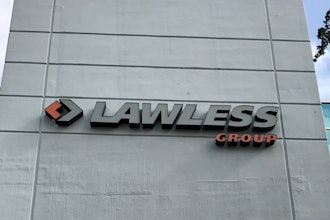
Major Climate Threat to Global Supply Chains Identified by New Research from the Carbon Disclosure Project and Accenture
NEW YORK; January 22, 2013 -- Seventy percent of companies believe that climate change has the potential to significantly affect their revenue, a risk which is intensified by a chasm between the sustainable business practices of multinational corporations and their suppliers, according to research published today by the Carbon Disclosure Project (CDP) and Accenture (NYSE:ACN).
“Reducing risk and driving business value” is based on information from 2,415 companies, including 2,363 suppliers and 52 major purchasing organizations who are CDP Supply Chain program members. These members include Dell, L’Oreal and Walmart, and they represent a combined spending power of US$1 trillion. The research marks CDP Supply Chain’s most comprehensive annual update on the impact of climate change on corporate supply chains.
Climate change presents near-term risks to businesses, according to the report. Fifty-one percent of the risks that disclosing companies associate with drought or extreme rain are already having an adverse effect on company operations, or are expected to within five years, say those businesses. Additionally, the destructive nature of extreme weather is likely a catalyst for company action on climate change, with physical climate risk identified in the report as a greater driver of investment than climate policy. Of the 678 companies investing in emissions reduction initiatives, three quarters (73 percent) say they feel that climate change presents a physical risk to their operations; just 13 percent identify regulation as a sole driver.
Most of the positive actions responding companies say they have taken in response to climate change are attributable to organizations that have been using CDP’s unique global system for at least two years, demonstrating that customer pressure is driving change. However, the report identifies a performance gap between companies and their suppliers, and it claims that this is intensifying climate risk in the global supply chain models.
Suppliers are significantly less prepared than their clients to respond to climate change, potentially threatening customer relationships and heightening supply chain vulnerability. Suppliers demonstrate a lower level of ambition to mitigate climate change risk, with just 38 percent setting emission reductions targets in comparison to 92 percent of purchasing companies. Similarly, at 27 percent, the percentage of suppliers investing in activities to reduce emissions is less than half that of CDP member companies (69 percent).
Unsurprisingly, CDP members are more likely to yield results from their environmentally sustainable business practices than suppliers, according to the survey. They are more than twice as likely to accomplish year-on-year emissions reductions (63 percent vs. 29 percent), and are better positioned to capitalize on the financial benefits of carbon management. While 73 percent of members are achieving monetary savings, such as reduced energy costs from emission reductions activities, only 29 percent of suppliers are enjoying such returns.
Paul Simpson, CDP’s chief executive officer says: “This research illuminates fragility in the global supply chain model. The marked difference in the sustainable actions of companies and their suppliers highlights a missed opportunity for suppliers to reduce energy costs and risks. The 61 percent of suppliers that failed to provide information through CDP are an even greater concern since they and their clients are unable to make a full assessment of the substantial climate risks or opportunities they face.”
The analysis of the information, processed through CDP’s unique global system for natural capital disclosure – now the largest and most comprehensive in the world – demonstrates the attractive returns that leading companies are enjoying from addressing supply chain sustainability. The 29 percent of suppliers that have reduced their emissions have saved some $13.7bn as a result. This implies aggregate potential savings of all 2,363 suppliers could reach three times that figure if the remaining proportion of suppliers were to achieve reductions at that rate.
“This report provides clear evidence that those who are most transparent about their climate change risks are more likely to achieve the greatest emissions reductions”, says Gary Hanifan, global sustainability lead for supply chain, Accenture. “And they are also more likely to enjoy monetary savings as a result of their responses to climate change risks. But the return on investment by the most proactive companies will not reach its full potential unless those companies can encourage their suppliers to follow their lead.”
The report is freely available from the CDP and Accenture websites. It provides advice on how companies can use data, process and governance to create a more sustainable supply chain and capitalize on the correlations between climate risk, performance and accountability to realize financial benefit. The report also includes supplier scoring data provided by the CDP Supply Chain scoring partner, FirstCarbon Solutions. Scores are available by region and sector, and show that European and Asian companies still outperform companies in North America.
About CDP
The Carbon Disclosure Project (CDP) is an international, not-for-profit organization providing the only global system for companies and cities to measure, disclose, manage and share vital environmental information. CDP works with market forces, including 655 institutional investors with assets of US$78 trillion, to motivate companies to disclose their impacts on the environment and natural resources and take action to reduce them. CDP now holds the largest collection globally of primary climate change and water information and puts these insights at the heart of strategic business, investment and policy decisions. Please visit www.cdproject.net to find out more.
CDP Supply Chain member companies
Accenture, Acer Inc., Amdocs Ltd., AT&T Inc., Banco Bradesco S/A, Bank of America, Braskem S/A, British Sky Broadcasting, BT Group, City of Denver, Colgate Palmolive Company, Dell Inc., Diageo Plc., Domtar Inc., EADS N.V., Eaton Corporation, Eletropaulo Metropolitana Eletricidade de São Paulo S/A, Elopak, Endesa, Eni SpA, FIBRIA Celulose, Ford Motor Company, Goldman Sachs Group,, Groupe Steria, Imperial Tobacco Group, Jaguar Land Rover Ltd, Johnson & Johnson, Johnson Controls, JT International SA, Juniper Networks, KAO Corporation, Kimberly-Clark Corporation, KPMG UK, L’Oreal, Marfrig Alimentos, MetLife, Inc., Microsoft Corporation, National Australia Bank, National Grid, Nestle, Nokia-Siemens Networks, PepsiCo, Philips Electronics N.V., Reckitt Benckiser, Rexam, S.C. Johnson & Son, Inc., SAB Miller, Starwood Hotels & Resorts Worldwide, Inc., Suzano Pulp and Paper, The Coca-Cola Company, Unilever, Vale, Vodafone Group, Walmart.
About Accenture
Accenture is a global management consulting, technology services and outsourcing company, with 259,000 people serving clients in more than 120 countries. Combining unparalleled experience, comprehensive capabilities across all industries and business functions, and extensive research on the world’s most successful companies, Accenture collaborates with clients to help them become high-performance businesses and governments. The company generated net revenues of US $27.9 billion for the fiscal year ended Aug. 31, 2012. Its home page is www.accenture.com.























